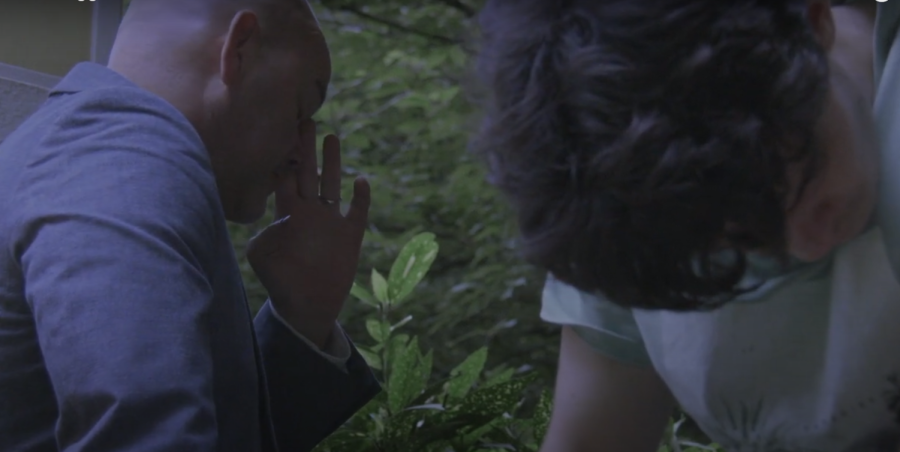Turning passion to “Action!”: Whitman junior Cash Martin’s experience creating a short film
July 2, 2023
A teenage boy walks cautiously through his small town, observing the world around him frozen in time. As he weaves between the people he knows and loves suspended in space, he begins to consider what has led him to this point. Left behind him in his home are opioids and a broken relationship with his father. Senior Cash Martin calls, “Cut.”
Fever sequences like this were a daily sight on the set of “Waterlogged,” a short film co-created and directed by Martin. Martin’s fascination with film dates back to childhood visits to his grandparents’ home, he said.
“Every time we went there, my grandfather had these walls of movies —anything from the ‘Maltese Falcon,’ which is a noir from the ’30s, to movies now,” he said. “We watched a ton of them, and we always went to drive-ins nearby.”
Martin’s parents also exposed him to other types of art. His father works as a photographer and his mother is a documentarian, both giving him a knack for visuals from a young age. Martin sees what he does as continuing his family’s legacy of love for different mediums.
Alongside co-creator and producer Xander Ehrhardt (’23), Martin has navigated the movie-making process from its creative inception through post-production.
He’s drawn to themes of introspection. “Waterlogged” main character Sebastian reflects throughout the film on his relationship with his abusive father. The idea for the story stemmed primarily from a scene in the action-adventure video game “The Last of Us Part II,” Martin said. A story about both broken families and mended one, the game had an emotional tone that provided the groundwork for Sebastian and his father in “Waterlogged.” Martin said it’s typical for him to draw inspiration from small details he encounters in his day-to-day life.
“Maybe it’s just one conversation, a book you read or maybe even another movie you see,” he said. “It can come from the littlest things.”
Putting together a script proved to be an arduous process. After a grueling cycle of writing, revising, rewriting and re-revising, he and Ehrhardt had created a draft they were satisfied with. At that point, Ehrhardt refocused the script to be realistic given the film’s $500 budget they scrapped together and available resources. With Martin’s creativity and Ehrhardt’s realism, the two students were able to finalize a reasonably ambitious script that they believed would portray the film’s original creative vision.
“I’m definitely more on the logistics side,” Ehrhardt said, “because while I do clarify the creative vision, a lot of the clarity for that is making things actually doable when we get into the production.”
The shooting process posed some logistical challenges. In the middle of the summer, trying to juggle actors’ schedules and travel plans perfectly proved impossible, and Martin and Ehrhardt had to make compromises. Still, Martin said that he was able to compose scenes he was proud of.
University of Maryland student Cyle Winters plays the lead role of Sebastian. For Winters, who is now pursuing an acting career in Atlanta, Martin’s directing style and the dedication of the other actors created an environment that allowed for everyone involved to put their best foot forward.
“When we got to film on set, everybody was very respectful, in terms of knowing that we all needed to work together to get this done and to portray Cash’s vision of the film and what he had written,” Winters said.
Once Martin had captured all of the scenes for the film, he was ready to begin finalizing. Throughout post-production, Martin adopted a hands-off approach, granting his editor Max Miller (’23) creative freedom, he said.
“I try to give my editor space because I think it’s good to have another set of eyes,” Martin said. “I, from day one, had a vision of what this was going to be like, and I think sometimes that can just become unbalanced.”
Now “Waterlogged” is officially finished. Following its preliminary screening this past spring, Martin plans to enter the film in October’s annual All-American High School Film Festival, a national competition for young filmmakers that takes place in New York City. Going forward, the film’s trajectory will depend on its performance in the Festival, and any others Martin may submit it to, he said.
“Waterlogged” marks only the beginning of Martin’s film career. He plans to pursue filmmaking in college and is already working to improve his directing techniques for his next project. Filmmaking, Martin said, is the only medium that can weave the detailed narrative he craves.
“There’s an expression: a photo can carry 1,000 words,’” he said, “but a movie has 24 photos in a second.”









